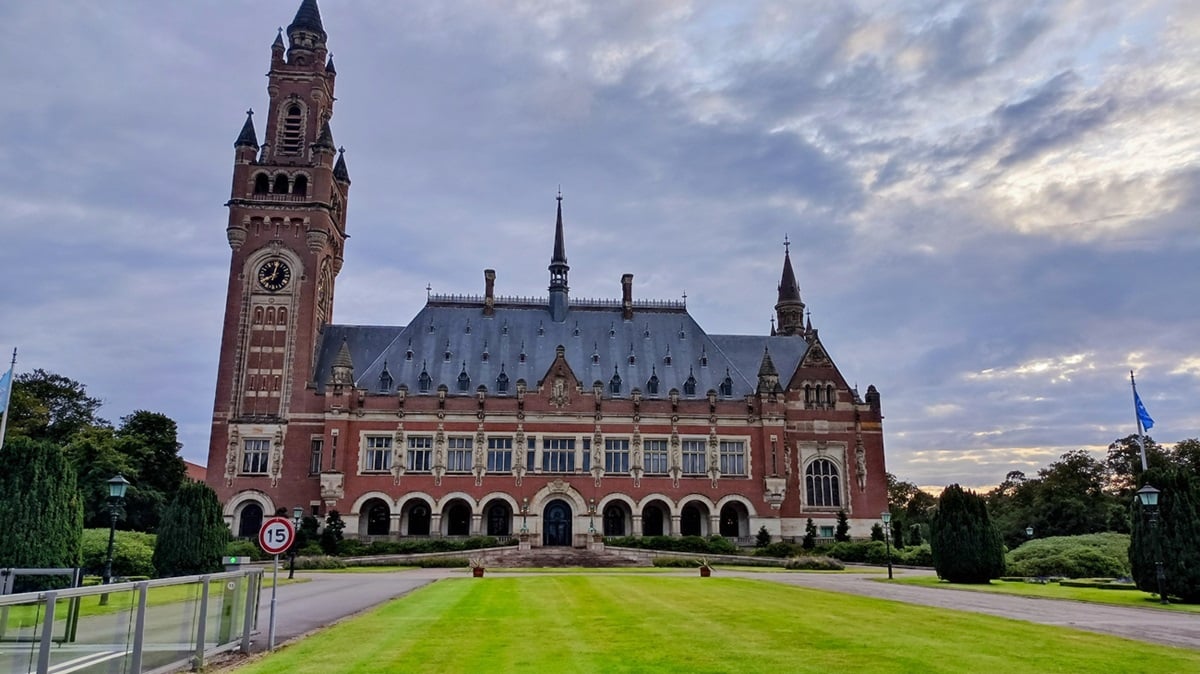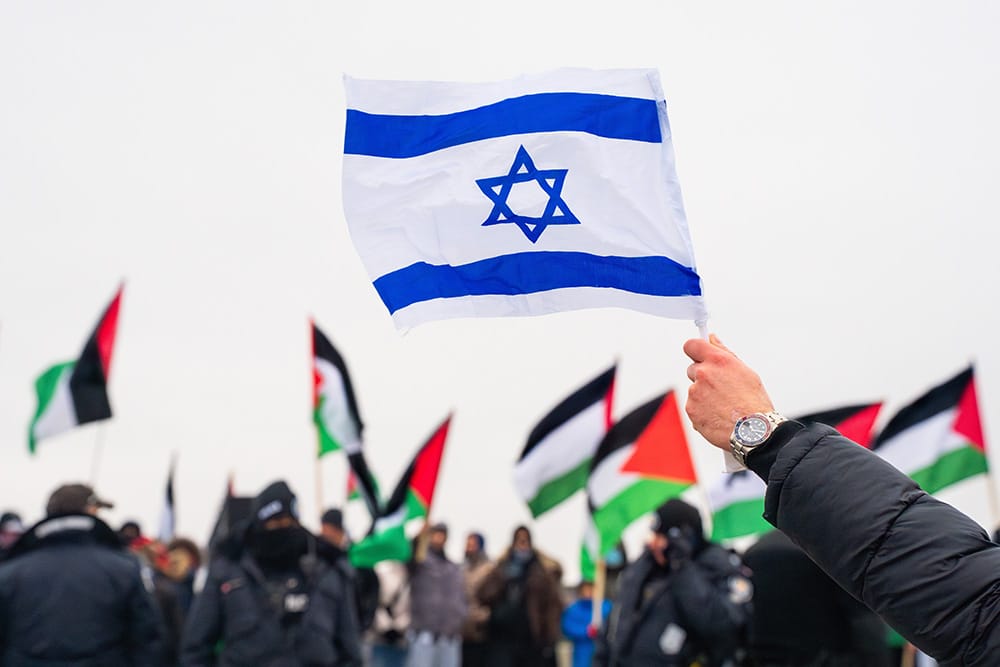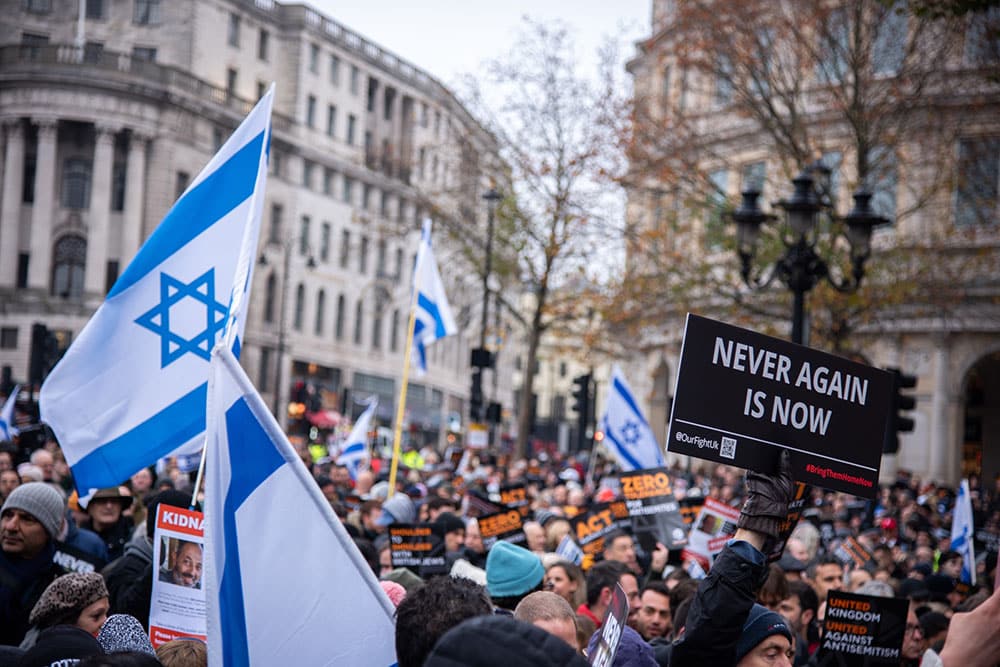
The IDSF’s ultimate goal is to ensure Israel’s security for generations to come. Two central understandings underpin this goal: The first is that the security of the State cannot exist in a vacuum; rather, it depends on an extensive system of political, economic and social factors. The second understanding is that in order to make informed decisions, it is necessary to build a broad strategy that is based on the past and looks to the future.
These understandings have led the IDSF to formulate a clear national vision based on in-depth research and touching on all the areas that shape Israeli society. In this article we shall focus, with the help of Adv. Yifa Segal, on the international legal system and the way Israel’s standing worldwide influences our national security and our very existence here. We shall also examine how to use our leveraging powers and technological advantages to better present ourselves and to improve our standing in the global arena.
Background – rules of war, Anti-Semitism and anti-Israelism: Trends in the world legal and social conversation
The international rules of war began taking shape less than 200 years ago. They were officially delineated only in the past century. The history of rules of war began in 1859. That is when the Battle of Solferino took place in Lombardy (present-day northern Italy), as part of the process of unifying Italy. Jean-Henri Dunant, an Austrian businessman, witnessed the consequences of the battle and was appalled by the way thousands of wounded were abandoned in the field. These spectacles drove him to establish a medical assistance organization to help the war-wounded, better known today as the “Red Cross”. About a year later a convention was held in Geneva, in which 12 countries signed a treaty, or convention, that granted immunity to medical teams and to any civilian assisting medical staff in a war zone. This was the first Geneva Convention.
In the early 20th century, two more Geneva Conventions were signed, which dealt with maritime warfare and with the treatment of prisoners of war. In 1949, following World War 2 and the horrific war crimes committed against civilian population by Nazi Germany, the first three Geneva Conventions were rewritten and another was added, which included rules concerning the treatment of civilians in wars and also concerning civilians within occupied territories, who are subject to the martial law of a hostile army. The Geneva Conventions and the lessons learned from the two World Wars form the basis for the rules of war which nowadays fall under the category of “international humanitarian law”.
Since there has not been another world ware since World War 2, the rules of war have remained unchanged for the most part. This being said, talk about human rights has in recent decades become a more and more key issue in the global social conversation. We see this conversation beginning to trickle down to international law, influencing rulings and decisions made in international courts, in various UN councils and in national parliaments. Using “human rights” as its pretext, the International Court of Justice ruled in 2004 that the Separation Fence, which was intended to provide us with a security defense, constitutes illegal annexation. Similarly, many countries have latched onto, and are still adhering to, the humanitarian excuse for boycotting Israel economically, culturally and academically.
More political, less just: the absurdity behind the international legal system
The international legal system includes two main institutions, both seated in the city of Hague in The Netherlands: the International Court of Justice (ICJ), tasked with adjudicating in disputes between countries, and the International Criminal Court (ICC), which is tasked with adjudicating the accountability of individuals in crimes such as genocide, crimes against humanity, war crimes and aggression. Besides the differences between their respective tasks, the two courts also have different authorities.
The International Court of Justice can rule only on matters concerning countries that have chosen to accept its authority – whether through advance consent or ad-hoc consent, or due to the signing of one Convention or another. Additionally, it is authorized to issue an advisory opinion on legal issues, at the request of the UN General Assembly or the UN Security Council.
The International Criminal Court, on the other hand, has more far-reaching judicial authority. Since it deals with individuals, it is authorized to issue international arrest warrants against individuals and it is also authorized to impose international sanctions. Until recently the International Criminal Court worked against brutal dictatorships such as Sudan and Libya but, following the outbreak of the Swords of Iron War, Israel too has found itself in the company of these undesirables. Shortly after the outbreak of the war, an attempt was made to issue arrest warrants against senior Israeli individuals, including Prime Minister Benjamin Netanyahu and Minister of Defense Yoav Gallant. The charge – involvement in war crimes and crimes against humanity. Meanwhile these warrants have not yet been issued, however if they do get issued, then the 124 member-states of the International Criminal Court will be obliged to arrest and extradite each and any defendant entering their territory – meaning that there might well be severe legal implications.

To all intents and purposes, the two international courts are apolitical judicial organs. The process of appointing the serving judges is, however, a decidedly political process and as a result, these two institutions have consistently been exhibiting a glaring anti-Israel attitude. This unfairness is also related to ingrained anti-Semitism – more on that later – and also to the disparity in the expectations, which began taking form already back in the days the rules of international war were written.
When the western powers wrote the rules of war in the early twentieth century, the hope was that these would form the rules that would dictate the global agenda and would apply to every country in the world as well as to non-state entities. In reality they only affect a handful of countries that share similar values. Then and now, most players on the international stage do not share the values of democracy and liberalism. As a result, many of them disregard the international rules and even openly support terrorism.
One might have expected a well-functioning legal system to mete out its judgments equally with any country that violates international law, however what we see is that most countries manage to evade judgment thanks to the close-knit bloc they belong to and to the powerful political influences. This is the case with Muslim countries and with anti-Western countries, which have banded together and shield each other, including in cases where egregious crimes are being committed. In the same vane, this is also what happens with western, democratic countries, which ally themselves with one another or with powers that are powerful enough to defend themselves, like the United States. In this context one such case stands out – in which the international court sought to examine whether the United States committed war crimes in Iraq and Afghanistan. John Bolton, who at the time was President Trump’s National Security Advisor, attacked the international court and declared that the United States would not cooperate with an illegitimate institution. Bolton went as far as to threaten sanctioning the court in the Hague, which ultimately caused the court to withdraw and the investigation evaporated.
When one looks at the politics behind the international legal system, one realizes that there is no real concern for justice; instead it is simply a power play. If international courts take one course of action against certain countries, and a different course against other countries just because they uphold a different set of values, or because they wield considerable political power – then the inevitable outcome is that they lose credibility, and that the entire raison d’être comes into question.

From Anti-Semitism to Anti-Israelism
The international system’s preoccupation with Israel exceeds the volume of occupation with all the rest of the world’s countries combined. Unfortunately, this disproportionate dealing with Israel is not confined to the halls of justice alone. It spills over into the streets in the form of demonstrations, petitions, boycotts, and even terrorism and violence.
The anti-Israeli sentiments prevalent worldwide are undoubtedly a form of anti-Semitism. Suffice it to listen to the chants and speeches at the various demonstrations to understand that people are not merely condemning Israel, the conversation is about the very delegitimization of the existence of the State. It goes so far as to justify extreme, violent actions such as kidnapping and murder of civilians.
There is no other case in the world in which the very legitimacy of a country is called into question, as is the case with Israel. Even in the most glaring cases of violent, rogue regimes and illegal conduct – including what is happening in Russia, China and Iran – one does not hear claims that these countries should not have existed in the first place and that they should cease to exist without delay. Clearly the conversation about Israel goes far beyond reason, It is driven – at least in part – by a clear hatred of Jews as a people.

Adv. Yifa Segal: The Vision for International Law and Israeli Public Diplomacy (“Hasbara”)
Continue Resisting the International Legal System
Current state:
The international courts hide under a thin patina of judicial neutrality, while in reality they are biased political bodies. Suffice it to consider the identity of the judges to understand that a country like Israel has no hope of receiving a fair hearing. The person presently serving (September 2024) as presiding judge in the International Court of Justice is a Lebanese judge – Nawaf Salam, who has a documented history of extreme anti-Israeli statements. He has even voted against Israel several times in the United Nations. According to the rules of that court, when a judge is called upon to adjudicate in matters concerning a country towards which he has an obvious negative attitude, he must recuse himself. Salam did indeed receive requests that he recuse himself from proceedings involving Israel but he refused to do so.
Besides the panel of judges, many of the rulings and legal opinions handed down by the International Court base themselves on distorted facts and ignore international precedents. Thus for example, in July 2024 the International Court of Justice ruled in a non-binding legal opinion that all of the Jewish settlement in East Jerusalem, in Judea and Samaria and in the Jordan Valley is illegal. When taking a closer look at the ruling, it transpires that the court is in fact calling for a total ethnic cleansing of all the Jews living in these territories – a completely unprecedented ruling anywhere in the world. The court ignores the deep historic link between Jerusalem and the Jewish People, it completely disregards the right of the Jews to self-determination, and it regards Palestine to be a full-fledged country with full sovereign rights, despite the fact that such a state has never been established.
No less incensing is the discrepancy between the yardstick to which Israel is being held, and the total absence of any yardstick when it comes to our enemies. Ever since the outbreak of the Swords of Iron War, Israel has been subjected to numerous allegations, while at the same time there is virtually no scrutiny of the legal violations on the part of the Palestinians.
In a properly-functioning international order, one that is not driven by short-sighted political expediency, we would expect a more detailed response from the ICC to Hamas’s horrific crimes, one would hope Israel would be examined under the context of the crimes committed on October 7. Besides that, it would have been desirable that many countries, not just a handful, would be alarmed by this blaming of the victim in the ICJ, that they would submit their objections accordingly.
Israel is also subjected to unjust treatment in the International Criminal Court, the ICC. When the possibility of issuing arrest warrants for Netanyahu and Gallant, the possibility of issuing similar arrest warrants against Yahya Sinwar, Muhammad Deiff and Isma’il Haniyah. Make no mistake – this is not about trying to strike a balance – the very idea of placing Israeli leaders in the same dock as the senior Hamas leaders is indicative of the crooked perception of reality and of a dangerous equation of Israel and a murderous terrorist organization.
The line Israel has been following in recent years, in most of the trials and debates held against us is a line of resistance. Realizing we will not be given a fair trial, Israel has deliberately opted not to take part in proceedings being conducted against it, thereby sending the message that it does not recognize the authority of the International Court. Besides this message, non-cooperation on the part of Israel also impedes the court when it attempts to drill down in its investigations since it is barred from accessing all the testimony and data, such that sometimes it is unable to deliver a ruling.
Ideally:
- Work to change the methodology at the international legal system: the international legal system purportedly operates democratically, however so long as most of the players involved are undemocratic, the distortions we are experiencing to our cost are bound to persist. Israel has got to exert Hasbara and diplomatic efforts to expose this injustice, which besets the international legal system. The goal should be to reorganize the method and the balance of power within the international courts.
- Refuse to cooperate with injustice: changing the international legal system will take time but it is also a long, complicated process. We must therefore focus mainly on its conduct. Israel has got to persist with the its policy of non-cooperation with biased legal proceedings. Contrary to what many believe, in most cases there is no point in participating in these proceedings since most of the judges arrive with a “precooked” verdict and we have no real way of influencing their decisions through legal means. The best we can do is repeatedly echo the message that we do not recognize the court’s authority, since it is operating in a manner that contradicts every conceivable principle of law and justice.
Use the leverage we have in the bilateral arena
Current state:
There are two different spheres of activity when it comes to diplomatic relations. The first is the multilateral arena – the domain of international institutions. The second is the bilateral arena – where the focus is on relations between two countries cooperating based on common interests.
In the multilateral arena, Israel is relatively isolated. We do not have a bloc to shield us like the Muslim countries have. On the other hand in the bilateral sphere we have many tools and leverage vis-à-vis individual countries with which we have collaborations. At the moment, however, these are not sufficiently being used.
Ideally:
- Improve our standing in the multilateral arena: Israel has got to invest in forming a bloc with other western countries or in joining an existing bloc, so as not to be isolated in the international arena and to ensure there will be countries that will shield it – as is exactly the case with the Muslim countries.
- Move from defensive to offensive: rather than work within a group of countries and try to stave off threats and sanctions, we ought to go on the offensive vis-à-vis countries where we do have leverage. Thus, will we be able to alter voting patterns in the United Nations and gain advantages in the international arena. One good example is our relationship with Jordan: behind the scenes, Jordan is dependent on us militarily and economically. It needs its cooperation with us but in the international arena it continually condemns us and works against us. We need to use our levers with Jordan, as we ought with other countries, and exact a price for the various anti-Israeli actions taken against us internationally.
Improve Israeli Public diplomacy (“Hasbara”)
Current state:
There is an expectation that the State should take responsibility for the entire issue of Hasbara. There are two reasons why this is an unrealistic expectation. First of all, many of the technologies that could be extremely effective in the Hasbara world belong to the private market. Secondly, Israel, being a state, is subject to copious bureaucracy and rules that do not apply to private citizens. Under these circumstances it is very difficult to operate freely.
Another problem with Israeli Hasbara is that Israel is numerically inferior compared to its adversary states. This makes it very difficult for us to counteract our enemies using traditional tools. No matter how much we might demonstrate – our enemies will always be able to outnumber us on the streets. No matter how much information we might release – our enemies will release more. We have therefore got to find a way to neutralize the quantitative element and achieve advantage by other means.
Another problem we face in this respect is that Jewish communities in the diaspora also occasionally turn against us and even inside Israel there are numerous voices that question the entire faith in the righteousness of our ways. It is obviously acceptable that one or another government policy can be criticized, but when Jews and Israelis criticize the State of Israel per se, the Hasbara damage is tremendous. It also results in internal fissures that weaken us as a nation.
Ideally:
- Hasbara is everybody’s responsibility: we need to let go of the state of mind that says that the State is supposed to take care of everything. After all, the State is the collective representing all of us. In the early stages of the war there was widespread engagement by the general public, which mobilized especially in favor of Hasbara and we scored some impressive results. Over time most people resumed their everyday life and the issue was abandoned. Once people realize that it is their responsibility, and that they are able to take part in the Israeli national Hasbara effort, we will be able to engage our best minds, freeing ourselves of the constraints that hobble the state and do wonders for Israel’s international standing.
- Leverage our technological superiority: since we cannot bridge the quantitative gap with our enemies, we have to find our advantages in other areas. Outstanding among these is technology. Israel is a leader in this area. If we concentrate our efforts and adopt new tools, such as AI, we could improve our Hasbara capacity and better echo the messages we want to convey.
Not neglect the domestic Hasbara channels: The Israeli Hasbara efforts need to be directed inwards, not only outwards. We must see to it that the country’s citizens do not fall prey to false information and that they do not take part in propagating these lies to the rest of the world, since this weakens us as a people and is even more detrimental to our international image.

Increase enforcement in Israel and worldwide
Current state:
Around the world, and in Israel as well, there are various organizations that are operating under the umbrella of humanitarian work and human rights while in actual fact they are part of a well-organized terrorist network. These organizations pose a great danger since they create a false picture of the reality and drive processes harmful to Israel in terms of its Hasbara, its legal standing, and sometimes they even result in actual terrorist attacks.
These organizations employ sophisticated modus operandi. In most cases it is extremely difficult to pinpoint the link between them and terrorist organizations of terror-supporting countries. The result is an absurd state of affairs where around the world and in Israel itself, various NGOs are operating, benefitting from tax exemptions and other advantages while in effect calling for the destruction of Israel.
Despite the difficulty, a concerted effort and efficient investigation and interrogation techniques would enable incrimination of the fraudulent organizations and taking effective anti-crime measures against them. Germany has provided one example of this . Since the outbreak of the Swords of Iron war and the global rise in anti-Semitism, Germany has increased its investigation and enforcement in this area. In July 2024 it managed to shut down an organization that had for many years been operating as an offshoot of Iran.
Ideally:
- Fight terrorism-supporting organizations: Israel has to increase the State’s domestic enforcement and carefully scrutinize suspicious organizations operating within it so as to understand where their financing is coming from and with whom they are in contact. The State has also got to withhold tax benefits from NGOs that condemn it and even call for its destruction.
- Mobilize foreign states: Israel must harness other countries in favor of the fight against terror-supporting organizations and make it clear to them that if there are organizations within them calling for anti-Semitism and genocide, this is a national problem requiring their intervention.
No Quick Fix: Summary and Conclusions
The international institutions, primarily the United Nations and the international courts, have long ago become yet another weapon in Israel’s enemies’ arsenal – a weapon they use skillfully. Even though the international courts have no way of enforcing their rulings against Israel, the damage caused to Israel’s image abroad is considerable. It shapes a false image of Israel and brands it as a rogue state.
It is important to understand that the courts’ rulings affect not only the legal and diplomatic arenas. They filter down into society and influence public opinion, including the opinions of key media personalities and influential global political and security influencers. The courts’ rulings also lend legitimacy to various NGOs and humanitarian organizations worldwide and sometimes lead to sanctions and boycotts being imposed on Israel, causing it economic harm and damaging cultural exchanges. Worse than that, the rulings by the international courts play into the hands of Israel’s enemies. They fan the flames of anti-Semitism around the world and stimulate the calls to delegitimize Israel.
The inherent injustice typical of the international legal system is infuriating and our ability to reshape the system is very limited. This being said, we should not remain idle. Israel has got to exploit its leverage with various countries worldwide, it must augment its control and enforcement capabilities, and it must achieve technological advantages to enable it to counteract its enemies, who far outnumber us. The population at large must also understand that they bear their share of responsibility. They have to seek ways to contribute toward improving Israel’s Hasbara worldwide. They must help silence the voices from outside and from within that call for banishing us from our land and even for our extermination.
At the same time we must realize that we need to take a deep breath, that there is no instant precooked solution for our predicaments. The task of improving Israel’s image and legal standing is going to take a lot of long-term, hard, challenging work. Our enemies have been patiently working to tarnish our image for decades. Now is the time for us to exhibit the same patience.



